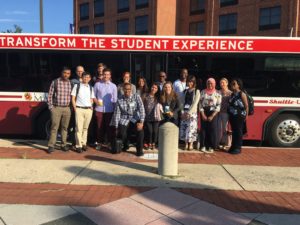GVN Short Course Helps Virologists Broaden Expertise in 2019
GVN Short Course Helps Virologists Broaden Expertise
 Education and training are central to the Global Virus Network’s (GVN) mission. “We want to support and train the next generation of virologists,” says Christian Bréchot, MD, PhD, the president of GVN, “and make sure we have enough highly-skilled experts in the field around the world.”
Education and training are central to the Global Virus Network’s (GVN) mission. “We want to support and train the next generation of virologists,” says Christian Bréchot, MD, PhD, the president of GVN, “and make sure we have enough highly-skilled experts in the field around the world.”
As part of that mission, the GVN offers an annual, week-long intensive course to help early-career scientists and physicians broaden their expertise, learn about the latest developments and innovations in the field, and meet other virologists from all over the world. About 15 to 20 participants are chosen to attend the program each year. This year the 6th GVN Short Course in Basic and Translational Virology will take place from July 28 to August 3, 2019.
A range of topics taught by leading-experts in the field
The course is taught by leading experts in the field, including Dr. Brechot and Robert GalloCo-founder and International Scientific Advisor, GVN; Kara Carter, MD, Senior Vice President, Infectious Disease at Evotec and President-Elect of the International Society for Antiviral Research (ISAR); Man Charurat, PhD, MHS, Professor of Medicine, Director, Division of Epidemiology and Prevention, IHV; Konstantin Chumakov, PhD, Associate Director for Research, Office of Vaccines Research and Review, U.S. Food and Drug Administration; Diane Griffin MD, PhD, University Distinguished Service Professor of Molecular Microbiology and Immunology, Johns Hopkins Bloomberg School of Public Health; Shyam Kottilil, MD, PhD, Professor of Medicine, Director, Division of Clinical Care and Research, IHV; Mary Marovich, MD, Director, Vaccine Research Program, Division of AIDS, National Institute of Allergy and Infectious Diseases, NIH; Ab Osterhaus, PhD, DVM, Director, Research Center for Emerging Infections and Zoonoses, Professor, University of Veterinary Medicine Hannover, CEO, Artemis One Health Foundation; and Clement A. Adebamowo, BM, ChB, ScD, FWACS, FACS, Director For Global Health Cancer Research at the University of Maryland School of Medicine and PI of the NIH funded African Collaborative Center for Microbiome and Genomics Research (ACCME).
Topics include the latest research on diseases such as hepatitis, HTLV-1, Ebola, Lassa fever, HIV, measles, influenza, and other viruses, as well as on focus areas such as vaccine development, bioinformatics, biosecurity, and one health. Participants also meet with policymakers and program officials at the National Institutes of Health (NIH).
Attendees expand their knowledge of virology
Yuki Furuse, MD, PhD, Assistant Professor at the Institute for Frontier Life and Medical Sciences at Kyoto University, Japan, attended the course in 2016 as a post-doc. Dr. Furuse, who had made the switch from pediatrics to virology, says he wanted to “to expand his knowledge and experience in the field.” He came back to lecture the next year on the World Health Organization’s response to the Ebola outbreak and his own work with the organization. “I was happy to share my knowledge and experience with the participants,” says Dr. Furuse, “and excited to see so many young people who are eager to learn about virology.”
Attendees connect not only with the experts, but also fellow participants. “I feel like I learned so much from the other people who took the course,” says Elysse Grossi-Soyster, MS, Laboratory Manager and Researcher at the LaBeaud Lab at the Stanford University School of Medicine. Grossi-Soyster attended the GVN Short Course in 2018 and was selected by her classmates to be the next emerging leader in medical virology and to return as a speaker at this year’s course. “I was shocked,” says Grossi-Soyster, “there were so many smart people in my group who were doing really interesting work, and they chose me.” Grossi-Soyster will discuss her research on the Rift Valley fever virus.
Grossi-Soyster is also the founder of the STEM Outreach Collective, a non-profit that brings researchers in STEM into middle and high school classrooms. As if that wasn’t enough, she teaches at her local community college and has a blog focusing on infectious disease and global health. She says the course helped expand her horizons. “We often get into our own work and don’t think about other areas,” says Grossi-Soyster. “Participating in the short course brought new perspectives to my work.”
